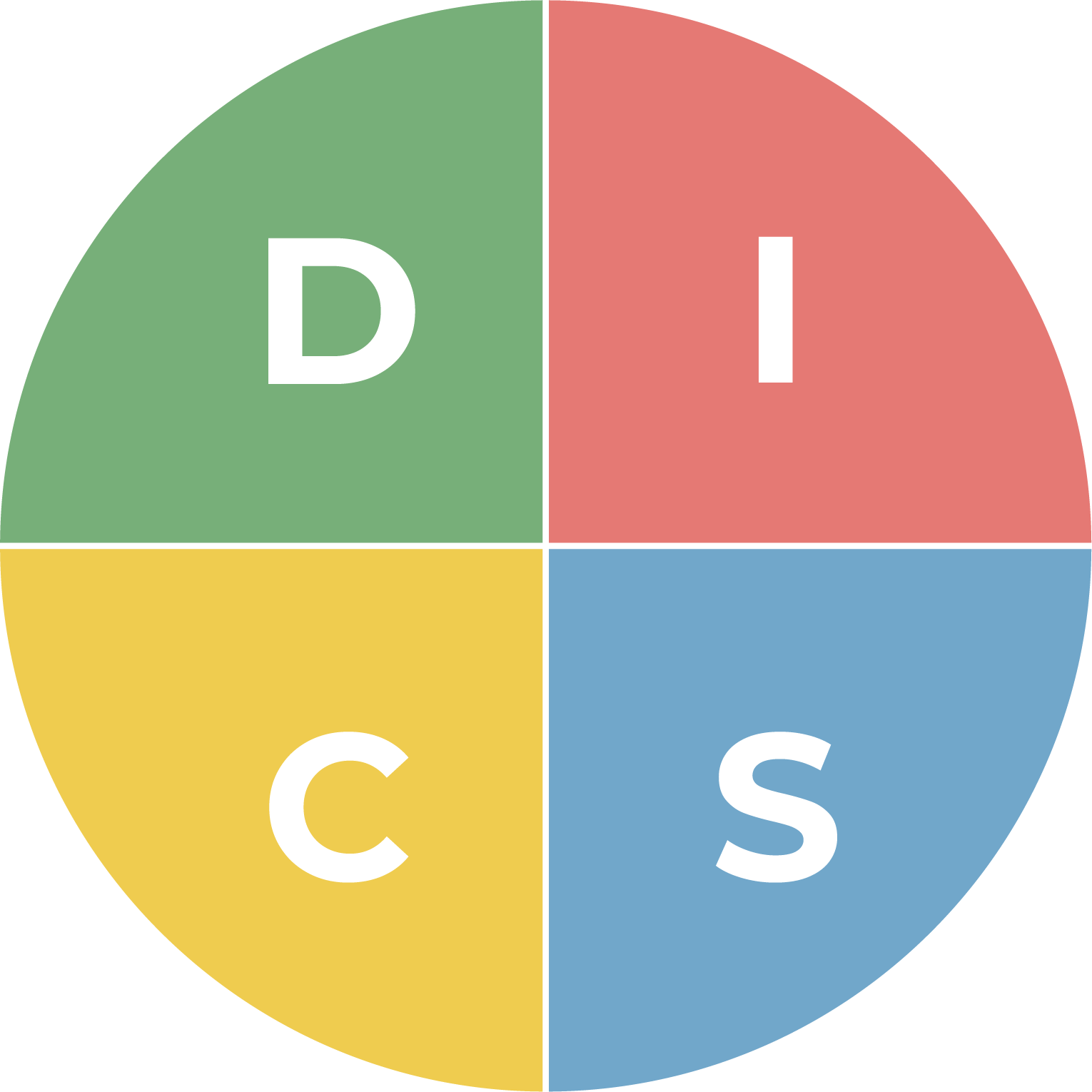
Improving your business interactions through insight and learning
Through tailored training and workshops; we develop your people’s personal insight and communication skills, helping you to retain clients and develop employees

DiSC in under
100 words
DiSC is behavioural assessment tool which is used to describe the different types of behaviour styles and preferences that people are likely to display in different situations. It is a tool which helps both self-awareness and also helps to identify the styles of others.
DiSC can help within the workplace in a range of ways – building more effective teams, reducing conflict, better fit with job roles, creating closer connections with your clients and enhancing sales performance to name a few.

by Alyson McNeela
•
23 Apr, 2021
As Stress Awareness month comes to a close, we’re reflecting on some of the tools that can help to alleviate the tensions of everyday life. Fatigue from the past year means that self-care is more important than ever right now in maintaining balance and energy as well as reducing stress. There is a lot of information out there and we can become overloaded with what we think we should be doing, and possibly frustrated when it doesn’t seem to be impacting in the way we had hoped. So let’s pause for a moment, and consider that true self-care looks different to everyone. The only way to work out what meaningful self-care might look like is to understand more about our personality type – what drives us, motivates us and what causes us stress. Whilst the idea of signing up for a rigorous exercise challenge might leave some feeling overwhelmed, for others it will help to return mental balance to others. Our D-styles (Dominance) tend to be so focussed on moving forwards and achieving results that they can forget to take care of themselves and stop to breathe and celebrate their accomplishments. Since they tend to draw their energy from being active and sitting still can be a source of frustration, activities which provide a challenge and that they are passionate about will tick the box and leave them that much needed stress relief. Here are some ideas for D-styles: • Taking some action towards long term goals • Diving into something that ignites your passion! • Sign up to an exercise challenge • Take part in a competitive sport With i-styles (Influence), they thrive on making connections with people, like new adventures and don’t like to be restrained by rules and regulations. In this age of working from home, isolation can be a major source of stress for the i-style, and self-care will need to factor in spending time around people and freedom and flexibility of routine. Here are some ideas for i-styles: • Make small connections with other people every day – make friends with your local barista! • Go out for a walk with no particular destination in mind • Plan a trip to somewhere you haven’t been before – even if you can’t go yet! • Attend a group exercise class S-styles (Steadiness), by their nature, often forget to take care of their own needs as they are so focussed on putting the needs of others first. Therefore self-care for them really needs to be planned in to make sure that it doesn’t fall to the bottom of the pile. For them, personal connection is also important and spending time with those they really care about is important. Here are some ideas for S-styles: • Journaling and writing down feelings • A 1-2-1 walk with a close friend • Setting boundaries • Write down one thing every day to do for yourself For C-styles (Conscientiousness) , being around people a lot can drain energy levels and spending time alone plays an important part in self-care for this style. They tend to have a logical and analytical approach to life and researching and learning about new things that interest them is truly rewarding to this style. Here are some ideas for C-styles: • Make sure alone time is carved out – especially if you live in a busy household! • Do something which appeals to your logical mind – puzzles etc • An alone day which has structure and a plan • Lego! By understanding your personality style or blend of styles, you can start to customize a routine that really works for you and restores balance and reduces stress. If you would like to find out more about your personality style, why not get in touch for a chat and see how we can help.

by Alyson McNeela
•
08 Jan, 2021
According to a recent survey by Wiley, 12,000 employees were surveyed about their experience of conflict in the workplace. Here’s what they found: • 70% of managers said that interpersonal conflict negatively impacted the efficiency of their work place • Managers spend an average of 13 hours each month dealing with workplace conflict • 40% of workers said they have left a job as a direct result of unhealthy interpersonal conflict Depending on the level of management, it doesn’t take much to work out that it’s a very expensive use of time – both in terms of time spent in resolving issues, but also the time that is not being spent on doing something more productive! Based on these stats, around £3,000 would be attributed to direct costs of conflict for a manager on a £40,000 salary, which is estimated to be only a quarter of the overall cost which includes the hidden costs. The cumulative effective of this across an organisation adds up to big money! As part of Wiley’s research, they asked participants to say the first word that they could think of when it came to conflict. Drama, petty, tension, gossip, stress, arguments. These are a selection that repeatedly came up – it’s clear to see that the responses were overwhelmingly negative! In fact, 90% of all responses were a negative word. So what is workplace conflict? Tension over a deadline, different approaches to work or maybe conflicting personalities, some workplace conflict is inevitable. In fact, another multi-country piece of research suggests that 49% of all workplace conflict is down to ‘personality clashes’. What is worrying about this, is that it’s not actually anything to do with work itself, so is highly unproductive. If these differences are handled poorly, efficiency can be negatively impacted very quickly and if left to fester, make an unpleasant working environment! Conflict in the workplace can result in: • Poor morale and staff retention • High levels of absence • Wasted time • Poor communication • Divisive culture • Complaint, grievances and tribunals The positive outcome of ‘personality clash’ conflict, is that we can do something about it! Here are some steps to addressing conflict: • Set ground rules: clear frameworks and policies for decision making as well as clearly defined job roles can help make expectations clear • Keep calm: avoid brining emotions into the conversation and ensure that all communication is respectful, in context and not a personal attack • Tackle the issue head on: it’s easy to avoid conflict, but being proactive in dealing with conflict early on will avoid resentment from building up and productivity decreasing • Adopt empathy: see the side of both parties; find commonalities to help find a compromise As we know, ‘personality clashes’ account for the majority of workplace conflict. The good news is that we can do something about it! By recognising that conflict can actually be productive, if approached in the right way, we can begin to remove some of the negative connotations that are associated with conflict. Conflict can make our ideas better, enables creative problem solving and increase efficiency. Organisations need to create a safe space for productive conflict, where communication is respectful and focussed on work and tasks. So what steps can we take to achieve this? As always, self-awareness is the first step to challenging how we respond to different situations, and we can look to DiSC to help with this. Different DiSC styles will have different approaches to conflict. Some will see it as a challenge and others will avoid at all costs. If you know your DiSC style, you will already be aware of how you might respond in certain situations, and applying this to conflict can help focus on curbing destructive behaviours and choosing productive behaviours instead. By taking a step back and understanding how other styles might react in conflict, we can begin to adapt our styles to disarm situations and result in an outcome that benefits everybody. Focusing on productive conflict has many benefits that will enhance the overall efficiency and profitability of your business. To learn more about DiSC and Productive Conflict, contact Discovery People for a conversation today.

by Alyson McNeela
•
23 Sept, 2020
According to the recent How We Live report by Aviva, a whopping 53% of people are planning to do something different to what they were doing pre-pandemic. There are a range of reasons for this - from those looking for more flexibility, to gaining different skills or perhaps finding greater fulfilment. The desire for this change could be through choice or necessity. Seeking a new opportunity can be draining in itself, but if you’re one of those people looking for a new role (or even considering it!), have you thought about what drains your energy when it comes to your time at work – past, present or future – and why? The DiSC psychometric assessment tool might give some insights as to why! The tool is used to describe the different types of behaviour styles and preferences that people are likely to display in different situations. You may have come across psychometric tools before, but with the DiSC model, there are four quadrants, each representing a different DiSC style. We tend to have a preference towards either a Dominance (D), Influence (i), Steadiness (S) or Conscientiousness (C) style, although in reality, many people are a blend of styles. Think of your preference, or style, as your home base. This is where you are at your most comfortable, and the behaviours associated with this style come naturally to you – they don’t feel like an effort. Move into a situation where behaviours typically associated with other styles are required, and you’ll begin to have to stretch, make more effort, and this is where our energy starts to become drained! So how does this relate to the workplace? Take an i-style for example. These individuals crave a sociable environment. The more people they can meet and connect with the better. In fact this is where they draw their energy from! So it’s no surprise that they often feel right at home in jobs where human connections and networking play a large part, such as sales or business development roles. The i-styles also often become bored very quickly, with their attention flitting from one thing to another – whatever seems the most exciting in that moment! So the even the prospect of sitting alone, crunching data, reviewing numbers and delving into detail for long periods of time can drain the energy from i-style colleagues! Most jobs will require a range of skills that are associated across the spectrum of the four different styles and it’s unlikely to find yourself in a situation where you are undertaking tasks and working in situations that you love all of the time. It’s also not to say that you can’t achieve excellence and be successful in roles that stretch you into other styles frequently. But, it may be a contributing factor to feeling that your energy is often drained. This can lead to a lack of motivation at work and negatively impact our home lives too. A delegate in one of my workshops demonstrated this perfectly! This individual was an SC style – somebody who prioritizes stability and can be fairly reserved. In a previous role they had worked in a high-end luxury hotel as part of the front of house team. The job was fast-paced and the hotel envisioned a 5* experience for guests, with front of house to be like a ‘stage’ – think exuding radiance and lots of jazz hands. He was given full training in what was expected, and he was hugely successful in the role. He ‘performed’ on every shift, but each day after coming home from work, he was entirely drained of energy and found it difficult to engage socially with friends and family because he just needed to spend some time alone to recharge. This can also be true of companies. When you’re considering companies on your job search, think about what might their DiSC style be, and how yours might fit with that. For example, a fast paced, process free, policy-less organisation that thrives on innovation might quickly drain the energy of our C-styles, who are motivated by logical reasoning and quality standards. Likewise, a slow paced and bureaucratic organization might quickly frustrate a D-style, who prioritize autonomy and independence. Final Thoughts So as you’re considering your next move, take a moment to think about the skills and behaviours that will be required frequently. Are these close to your home base or will they take you into your stretch zone? To access personal insights into your own style and how you can make it work for you, get in touch today.
Cookies policy. Privacy policy.
© 2020 Discovery People. All rights reserved.
Company number: 12464712.
Website by Divergent Path
